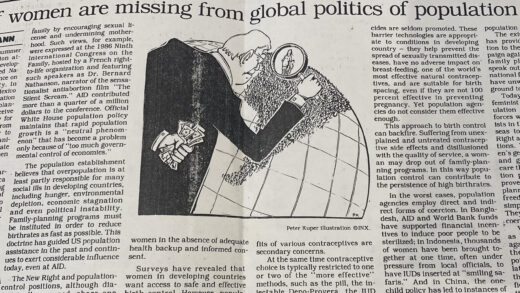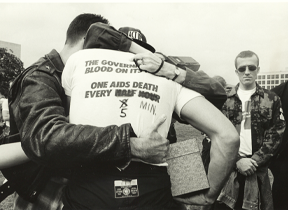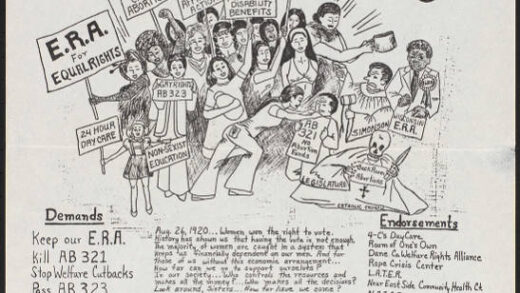by Moby Yang

How have anti-abortionists in the US weaponized “anti-sexism” and “anti-racism” to restrict access to abortion? More specifically, how have they manipulated the history and persistence of sex-selective abortions in Asia to push their own anti-abortion agendas in the US? My podcast will answer these questions by exploring a brief history of sex-selective practices, the emergence of sex-selective abortion bans in the US, and their impact on reproductive healthcare for Asian Pacific Americans.
Transcript – Wolves in Sheep’s Clothing
National Right to Life calls it a “war on baby girls”1—brought to the so-very moral America by Asian immigrants contagious with “backwards” values from their homeland. As New Jersey Representative Chris Smith proclaimed in 2012, “Today the three most dangerous words in China and India are ‘It’s a girl.’ We can’t let that happen here.”2
These sentiments all emerged during a wave of anti-“sex-selective abortion” panic that came down on American lawmakers and pro-life proponents in the early 2010s. Their goal? To pass bans on sex-selective abortions, or SSA. Their method? To use the reality of sex-selection in countries like China and India to bandy the illusory threat of heartless daughter-killing in the US—executed in particular by the growing Asian communities immigrating to America.
On the surface, enacting bans on sex-selective abortions may sound like a good idea. It’s true that widespread sex-selective practices have persisted in other parts of the globe. As of 2017, in comparison with the global sex-ratio at birth of 105 boys for every 100 girls, China and India skewed significantly towards boys, with ratios of about 114 and 111, respectively.3
But you may be thinking, what does that have to do with America? And you’d be right to ask. The logic behind banning sex-selective abortions in the US is imbued with anti-Asian racism. Studies have since debunked any myths around substantial sex-selection amongst Asian immigrants living in the US; foreign-born Chinese, Indian, and Korean families have actually been found to have more daughters on average than white Americans; and it’s not uncommon for these families to have come to the US in the first place for the sake of living somewhere with more opportunities for the women in their families.4 Not only that, but skewed sex ratios exist in several countries, including those which are predominantly white.5 And yet, unsurprisingly, lawmakers only accuse Asian immigrants of waging war against baby girls.
This isn’t the first time legislators have tried placing barriers to abortion in the name of supposed “anti-bigotry.” We saw it with bans on race-selective abortions in the name of anti-racism, and now again with bans on sex-selective abortions in the name of anti-sexism. The appeal of such an argument is that it manages to pit “feminism” against abortion access, while also dividing the reproductive justice movement between more mainstream pro-choicers and those who recognize the racism laden in the fight against SSA.6 As reasoned by former Arizona Representative Trent Franks in 2012, “liberals… have to make up their mind [on] whether they are so committed to abortion on demand that they think that includes killing little girls [just] because they are little girls.”7
But legislators like Franks, of course, don’t actually care about feminism. Their track records of voting against things like family planning, pay equity, and protections from domestic violence aside,8 there exist several pre-conception methods of sex selection, especially as new reproductive technologies come into circulation, and yet, these supposed protectors of baby girls only focus their attention on sex-selective abortions.
As some have described it, these lawmakers are wolves hiding in sheep’s clothing, waving around stereotypes of Asian immigrants as a rallying cry to ban SSA and save unborn daughters, all while they mask their true goal—restricting access to abortion as a whole. Or as Miriam Yeung, director of the National Asian Pacific American Women’s Forum (or NAPAWF), argues, “the [anti-Asian] racism” built into the clamor against sex-selective abortions is “laid so bare” that really, “the wolf has left off the sheep’s clothing” entirely.9
NAPAWF has played an active role in fighting legislative efforts to ban SSA, which has been crucial considering just how determined these politicians were in passing these restrictions into law. [PAUSE] The aforementioned Trent Franks was a real anti-SSA warrior—introducing, failing, and re-introducing on the federal level variations of his “Prenatal Nondiscrimination Act,” or PRENDA, several times from 2008 to 2017.10 Clearly, he wasn’t met without pushback, especially with organizations like NAPAWF and the NAACP around to bear witness. In 2011, NAPAWF executive director Miriam Yeung testified against the bill in Congress, and in May of 2013, on behalf of both NAPAWF and the NAACP, the ACLU filed a lawsuit against Arizona’s sex- and race- selective abortion bans on the grounds of discrimination against Black and Asian American women.11 Unfortunately, the ban persisted—Franks’ Arizona being one of the few states with bans on both sex- and race-selective abortions—and as of today, bans on sex-selective abortion are active in eight US states: others including North Carolina, Oklahoma, and Pennsylvania.12
What these bans do is criminalize doctors who perform abortions when they know or even just suspect their patient is seeking an abortion due to a sex-preference. Some bans even force healthcare providers to report patients to law enforcement based only on suspicion that sex-preference may be at play.13 Due to the nature of how these bans emerged in the first place—under the fear-mongering rhetoric of backwards Asian American immigrants who, as South Dakota Representative Don Haggar describes, see sex-selective abortions as “culturally okay”14—this creates the perfect storm for the breakdown of trust between Asian Americans and their doctors, who may unfairly scrutinize Asian patients or deny them abortion care entirely, for fear of facing penalties like fines and jail-time—issues mirrored in Black patients seeking care in states with “race-selective” abortion bans.15
The real kicker is that these bans are completely ineffective. UChicago’s 2014 study on sex ratios in Illinois and Pennsylvania, both states which passed SSA bans before the turn of the century, found that the bans resulted in no changes to the states’ sex ratios whatsoever.16 That’s not to say that SSA bans do nothing. In fact, they do a lot. They add one more hefty barrier to proper healthcare for Asian Pacific Americans atop a mountain of others conjured by factors like immigration status, limited English proficiency, and financial restraints; all while opening the door for further government intrusion on individual’s reproductive decisions.17
The superficiality of these bans speaks for itself. If legislators like Franks actually cared about gender equality, they wouldn’t see sex-selective abortions and think, “We have to ban these!” As NAPAWF advocates, true solutions to preventing sex-selection lie in achieving systemic change, putting women on equal footing with men so that sex-preference doesn’t emerge in the first place.18
This moral panic against sex-selective abortions reveals just how cunning pro-life proponents can be in their efforts to close off access to abortion, as well as how matters of racism and xenophobia must always be included in conversations around reproductive justice. Unfortunately, as I mentioned earlier, sex- and race-selective abortion bans are still active in several states, and they continue to uphold real barriers to fair healthcare for Asian Pacific and Black Americans seeking abortions and proper reproductive care. For now, I hope that this podcast helped give context to these deceptively “anti-racist” and “anti-sexist” abortion bans. Don’t be fooled by the names gilded in wool; these laws are wolves in sheep’s clothing, and it’s up to us to expose and expel them.
- Redden, “GOP Lawmaker.” ↩︎
- Milbank, “Republican’s abortion bill.” ↩︎
- Eklund and Purewal, “The Bio-politics,” 35. ↩︎
- National Asian Pacific American Women’s Forum, Defeating Sex-Selective Abortion Bans, 7-8. ↩︎
- University of Chicago Law School – Global Human Rights Clinic, National Asian Pacific American Women’s Forum, and Advancing New Standards in Reproductive Health, Replacing Myths, 27. ↩︎
- National Asian Pacific American Women’s Forum, “Race and Sex Selective Abortion Bans,” 4. ↩︎
- Bream, “House debates bill.” ↩︎
- National Asian Pacific American Women’s Forum, Defeating Sex-Selective Abortion Bans, 9. ↩︎
- Redden, “GOP Lawmaker.” ↩︎
- National Asian Pacific American Women’s Forum, “Race and Sex Selective Abortion Bans,” 1-2; Congress.gov. “H.R.147.” ↩︎
- National Asian Pacific American Women’s Forum, “Race and Sex Selective Abortion Bans,” 1-2. ↩︎
- University of Chicago Law School – Global Human Rights Clinic, National Asian Pacific American Women’s Forum, and Advancing New Standards in Reproductive Health, Replacing Myths, 7. ↩︎
- National Asian Pacific American Women’s Forum, Defeating Sex-Selective Abortion Bans, 11. ↩︎
- Redden, “GOP Lawmaker.” ↩︎
- National Asian Pacific American Women’s Forum, Defeating Sex-Selective Abortion Bans, 10; National Asian Pacific American Women’s Forum, “Race and Sex Selective Abortion Bans,” 2. ↩︎
- University of Chicago Law School – Global Human Rights Clinic, National Asian Pacific American Women’s Forum, and Advancing New Standards in Reproductive Health, Replacing Myths, 27. ↩︎
- National Asian Pacific American Women’s Forum, Defeating Sex-Selective Abortion Bans, 10. ↩︎
- National Asian Pacific American Women’s Forum, Defeating Sex-Selective Abortion Bans, 8. ↩︎



References
Bibliography
Bream, Shannon. “House debates bill to ban sex-selective abortions.” Fox News, May 30, 2012. Accessed November 26, 2024. https://www.foxnews.com/politics/house-debates-bill-to-ban-sex-selective-abortions.
Congress.gov. “H.R.147 – 115th Congress (2017-2018): Prenatal Nondiscrimination Act (PRENDA) of 2017.” January 23, 2017. https://www.congress.gov/bill/115th-congress/house-bill/147.
Defeating Sex-Selective Abortion Bans advocacy toolkit, 2015. National Asian Pacific American Women’s Forum records, Sophia Smith Collection of women’s history, SSC-MS-00586. Box 18. https://findingaids.smith.edu/repositories/2/archival_objects/205966
Eklund, Lisa, and Navtej Purewal. “The Bio-politics of Population Control and Sex-selective Abortion in China and India.” Feminism & Psychology 27, no. 1 (2017): 34-55. https://doi.org/10.1177/0959353516682262.
Milbank, Dana. “Republican’s abortion bill risks alienating Asian Americans.” The Washington Post, May 30, 2012.
National Asian Pacific American Women’s Forum. Defeating Sex-Selective Abortion Bans: Advocacy Toolkit. 2015.
National Asian Pacific American Women’s Forum. “Race and Sex Selective Abortion Bans: Wolves in Sheep’s Clothing.” National Asian Pacific American Women’s Forum, July 2013.
Press about Selective Abortion Bans, 2012 – 2014. National Asian Pacific American Women’s Forum records, Sophia Smith Collection of women’s history, SSC-MS-00586. Box 18. https://findingaids.smith.edu/repositories/2/archival_objects/390331
Redden, Molly. “GOP Lawmaker: We Need to Ban Sex-Selective Abortions Because of Asian Immigrants.” Mother Jones, February 25, 2014.
Sex-selective Abortion Laws in the United States booklet, 2014 June. National Asian Pacific American Women’s Forum records, Sophia Smith Collection of women’s history, SSC-MS-00586. Box 18. https://findingaids.smith.edu/repositories/2/archival_objects/205963
University of Chicago Law School – Global Human Rights Clinic, National Asian Pacific American Women’s Forum, and Advancing New Standards in Reproductive Health. Replacing Myths With Facts: Sex-Selective Abortion Laws In The United States. 2014.


